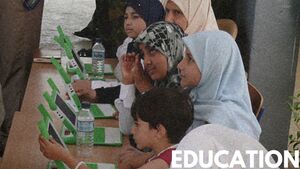
Sustainable development is an approach to growth and human development that aims to meet the needs of the present without compromising the ability of future generations to meet their own needs. The aim is to have a society where living conditions and resources meet human needs without undermining planetary integrity. Sustainable development aims to balance the needs of the economy, environment, and social well-being. The Brundtland Report in 1987 helped to make the concept of sustainable development better known.
Sustainable development overlaps with the idea of sustainability which is a normative concept. UNESCO formulated a distinction between the two concepts as follows: "Sustainability is often thought of as a long-term goal (i.e. a more sustainable world), while sustainable development refers to the many processes and pathways to achieve it." There are some problems with the concept of sustainable development. Some scholars say it is an oxymoron because according to them, development is inherently unsustainable. Other commentators are disappointed in the lack of progress that has been achieved so far. Part of the problem is that development itself is not consistently defined.: 16
The Rio Process that began at the 1992 Earth Summit in Rio de Janeiro has placed the concept of sustainable development on the international agenda. In 2015 the United Nations General Assembly (UNGA) adopted the Sustainable Development Goals for the year 2030. These development goals address the global challenges, including for example poverty, climate change, biodiversity loss, and peace.
- For information related to student work on Appropedia, see Appropedia:Service learning and Portal:Service learning.
Education as development
Education levels among women is the most important factor[verification needed] in reducing family size and thus population growth.
Educated mothers are better able to ensure the health of their children.
Educated farmers are better able to learn about alternative farming methods, and read other useful information.
Education provides opportunities for work, and thus financial security, access to healthcare and other essentials and many more choices in life.
Education about international development
Should we try to maintain an exhaustive list, on an Appropedia page, or is that already done elsewhere? It would be a huge task.
Face-to-face courses include:
- RedRW's training programs.
- International Institute for Sustainable Development (IISD) (Village Earth) at Colorado State University.[1] Courses include $345 courses with 20 face-to-face hours, and 2 week courses for $1450.
- Educational Materials/Programs at NCAT's Smart Communities Network lists courses and materials in Sustainable Development.
Many universities have relevant programs. Notable examples include
Open Educational Resources
Open Educational Resources (OER) is the standard term for educational materials that can be freely accessed and used, either for personal learning or for classes.
For a listing of some relevant material on sustainability and international development, see the Open Educational Resources page.
Sustainability Education
People in many fields find themselves educating others about sustainability; social entrepreneurs, corporate communicators, non-profits, municipal workers, social workers and teachers are examples of those engaging the masses with sustainability.
Here's how Algonquin College trains educators to enroll people with the sustainability agenda. We begin with recognizing the critical importance of worldviews. The dominant model of development is unsustainable because it is based on a flawed view of the world. http://www.policyinnovations.org/ideas/briefings/data/000241
There are other worldviews wherein "the limits to growth" are understood and local, traditional knowledge informs "resource management" and "community development" (to put it in conventional lingo). http://inesad.edu.bo/developmentroast/2012/11/we-try-to-protect-the-biosphere-but-what-about-the-ethnosphere/
When we realize how many ways there are to see the world we realize that Western education was and is grounded in a colonial worldview that systematically discounts other ways of interpreting reality, other types of wisdom and other forms of governance.
Hence, some Sustainability Educators focus on decolonizing minds and mindfully re-inhabiting places.
http://web.archive.org/web/20210121013517/https://tinalynnevans.com/
Next, we look at the values embedded in media, policy and curriculum. We're inundated with competitive, individualist and exclusivist values, which are proven to be incompatible with the values of community involvement and addressing the big issues.
http://www.wwf.org.uk/wwf_articles.cfm?unewsid=4224
We need new media, policy and curriculum but for that to happen more people have to demand it. Sustainability Educators investigate what leads to participation in social change. We critique social and economic systems so we understand how to holistically engage people with sustainability; we understand our work as facilitating the much anticipated "paradigm shift". Here's a link to our program
and our original wiki
http://web.archive.org/web/20130516170219/http://sustainabilityeducationresources.wikispaces.com
As you can see, Sustainability Education is much different than Environmental Education, though that is a part of our program. This quick introduction gives a little insight into how we define and approach Sustainability Education. We've brought the dialogue here so we can share ideas and curate progressive media/curriculum together.